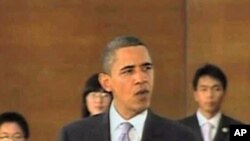During President Barack Obama's first year in office, he made great efforts to cultivate a good relationship with China and visited the Asian nation in November. But following public disagreements at the Copenhagen climate change summit in December and Chinese anger over an impending U.S. arms sales to Taiwan, disputes are once again threatening to overshadow the initial goodwill.
One highlight of President Obama's trip to China was a town-hall meeting with college students in Shanghai. The forum provided the only unscripted public event of his trip.
"Today we have a positive, constructive and comprehensive relationship that opens the door to partnership on the key global issues of our time - economic recovery, and the development of clean energy, stopping the spread of nuclear weapons and the scourge of climate change, the promotion of peace and security in Asia and around the globe," said President Obama.
Mr. Obama's three days in Beijing were largely occupied with bilateral meetings and sightseeing. He and Chinese President Hu Jintao appeared in front of reporters once. They both read prepared statements, but did not take any questions.
Some people in the United States were sharply critical of President Obama's China trip, saying he ignored human rights. Others said he allowed himself to be tightly controlled by China, which is the largest foreign lender to the United States.
Some analysts say this criticism is unfair. Peking University international studies professor Zhu Feng says China feels cheated on issues it feels are important, such as Taiwan.
"The biggest problem in U.S.-China relations is that if the United States needs China's cooperation, it should improve its treatment of China," said Zhu Feng. "The problem is that the United States has not changed its 30-year-old policy of selling arms to Taiwan."
For the Obama administration, the top issues include global concerns, such as Iran and North Korea, economic issues, such as frictions over trade and currency, climate change, free speech and human rights.
The American ambassador to China, Jon Huntsman, says President Obama sees US-China cooperation as essential to resolving international issues.
"Right from the beginning, there was a definition put on the U.S.-China relationship around global collaboration," said Ambassador Huntsman. "Because the president understood, rightly, that if the United States and China cannot come together and problem solve our more pressing issues of the day, no one else is going to get it done."
Huntsman says the two countries will continue to have disagreements. He says the atmospherics might get challenging from time to time, but the health of the relationship will be based on whether the two countries can keep from being sidetracked by their disputes.
US-China Relations to be Tested in President Obama's 2nd Year
- By Stephanie Ho




